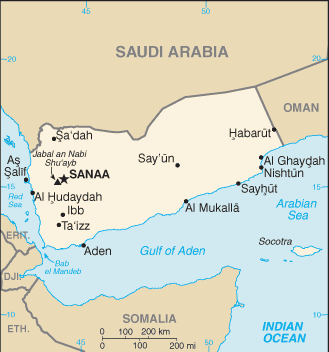Since the March 2015 Saudi invasion of Yemen, Saudi-coalition airstrikes have killed a preposterous number of civilian bystanders, and repeatedly hit places like schools and hospitals across the country. While the Saudis are forever downplaying such incidents, the reality of the Saudi air war is becoming increasingly apparent. It is a war not against the Shi’ite Houthi movement, but against Yemen’s population and economy.
 Even sources like the New York Times are starting to take notice that this is less an anti-rebel campaign and instead a war of systematically obliterating Yemen’s already bare-bones economy, targeting anything and everything and claiming “suspicion” if asked about it.
Even sources like the New York Times are starting to take notice that this is less an anti-rebel campaign and instead a war of systematically obliterating Yemen’s already bare-bones economy, targeting anything and everything and claiming “suspicion” if asked about it.
Indeed, as much attention as blowing up a hospital gets, in many cases the more harmful strikes are against places like food processors and basic industries, whose destruction exacerbates chronic food shortages in the nation and ensures that any post-war reconstruction will be arduously slow.
Whether it’s a potato chip factory or a poultry farm, anything large enough to be visible is a target, and many of the owners say they believe that they were targeted simply because they remained in business during the invasion, and that the Saudis see everything that’s operating as a war target.
UN humanitarian coordinator Jamie McGoldrick says the attacks are obviously deliberate, and that the “economic dimension” of the war is meant to put pressure on the Houthi movement. The Saudis deny this, however, insisting that the Houthis are to blame for all the Coca Cola bottling plants that Saudi warplanes bombed.
Either way, Yemen has gone from the poorest nation in the Middle East to an unrivaled global pauper, and while a lot of the resentment is aimed at Saudi Arabia, many see the Obama Administration’s support for the Saudi war as a key part as well, meaning that it is fueling anti-US sentiment in Yemen that will be a problem for generations.
And while historically Saudi Arabia has had the lobbying clout to be untouchable in Congress, recent votes aimed at blocking US arms sales to Saudi Arabia have been getting a surprising amount of support. It’s still not enough to block the sales, not yet anyways, but the trend is clearly going against the Saudis.
Before the war, Yemen imported some 90% of its food, and a naval blockade by the Saudis has severely limited the availability of food, particularly in the northern Houthi-controlled areas. That naval docks and airports in Houthi areas have also been repeatedly targeted by the Saudi warplanes only adds to these concerns.


